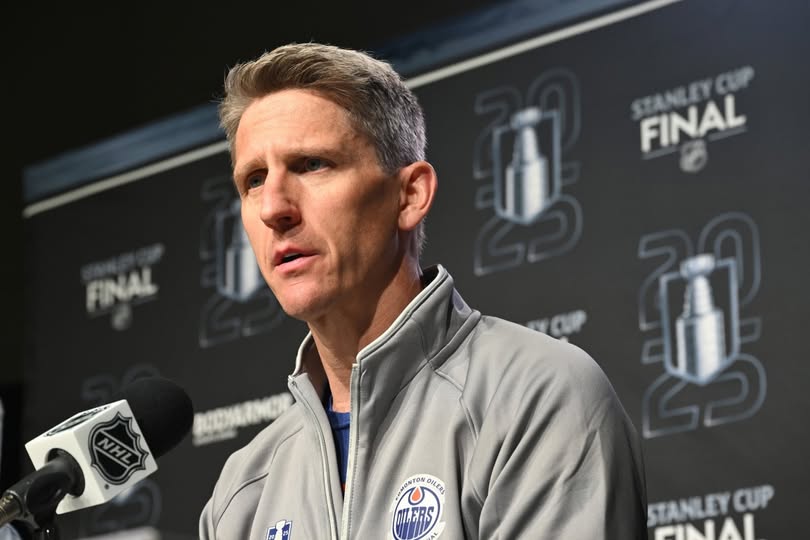
In the pressurized environment of the Stanley Cup Final, every word spoken by players and coaches is dissected, analyzed, and often amplified. Following the Edmonton Oilers’ frustrating 6-1 loss to the Florida Panthers in Game 3 of the 2024 Final, head coach Kris Knoblauch delivered a post-game statement that, on the surface, sounded like praise. Yet, beneath the veneer of commendation, lay a clear, sarcastic jab at the NHL referees, subtly expressing his team’s frustrations with the officiating consistency throughout the series.
The game itself was a chaotic affair, marked by a deluge of penalties and a noticeable unraveling of the Oilers’ discipline. As the Panthers extended their series lead to 2-1, Knoblauch’s carefully chosen words signaled that while his team bore responsibility for their lack of composure, he also believed the officiating had played a significant, and inconsistent, role in the series’ unfolding narrative.
Game 3: A Penalty-Filled Meltdown
Game 3 was arguably the most disjointed and penalty-laden contest of the 2024 Stanley Cup Final. It set a new standard for combined penalty minutes in a Final game, reaching a staggering 140 minutes, with the Oilers alone accumulating 21 minor penalties. This torrent of infractions severely hampered Edmonton’s ability to generate any consistent offense, as their star players spent an inordinate amount of time in the penalty box or on the penalty kill.
The Panthers, known for their aggressive, physical style, thrived in this environment. They capitalized on three of their 11 power-play opportunities, converting with ruthless efficiency. The game got out of hand quickly, with emotions boiling over, culminating in a full-line brawl in the third period that resulted in multiple ejections and over 80 penalty minutes in that frame alone. For the Oilers, the game felt less like a hockey match and more like a never-ending parade to the sin bin.
The Sarcastic Salvo: Knoblauch’s Post-Game Remarks
In the post-game press conference, a subdued yet calculating Kris Knoblauch addressed the media. He began with what seemed like a straightforward compliment to the officials:
“I think the referees did an outstanding job tonight,” Knoblauch stated, pausing briefly as if to let the full weight of his seemingly positive assessment sink in. He then quickly followed with the initial supporting detail, which served as the first layer of his sarcasm: “They even caught the too-many-men penalty in the first, which was too many men. They caught us there.”
On its own, acknowledging a correctly called penalty might seem innocuous. However, the tone, combined with the context of the preceding two games and the significant disparity in penalties in Game 3, made it clear that this was not genuine praise. The “too many men” call was a clear infraction, undeniable on replay, and the fact that it was caught perfectly highlighted a perceived double standard.
The true thrust of Knoblauch’s subtle jab, however, came immediately after this “praise.” He seamlessly pivoted to a lingering issue from Game 2, which had concluded in a double-overtime defeat for the Oilers:
“I just wish they had been calling it in Game 2 in overtime,” Knoblauch added, the sarcasm now unmistakable.
This pointed remark directly referenced a contentious non-call in Game 2’s crucial double-overtime period. In that sequence, the Panthers appeared to have six skaters on the ice during a key play where Oilers winger Viktor Arvidsson was impeded. The infraction, which was not called by the referees, occurred just minutes before Sam Bennett scored the game-winning goal for Florida, tying the series at 1-1. For the Oilers, that missed call was a bitter pill to swallow, directly impacting the outcome of a pivotal game.
Knoblauch’s method was deliberate:
- Feigned Praise: Starting with “outstanding job” disarmed any immediate defensive reaction from the league or the media.
- Highlighting the Obvious: Referencing the “too many men” call in Game 3, which was an undeniable penalty on his team, created an illusion of fairness.
- The Direct Comparison: Juxtaposing the clear Game 3 call with the missed Game 2 call highlighted the inconsistency he perceived, effectively calling out the officiating without directly accusing the referees of bias.
The Strategy Behind the Subtlety
Coaches, particularly in high-stakes playoff series, walk a tightrope when it comes to criticizing officiating. Direct, inflammatory accusations can result in hefty fines from the league and may also serve to galvanize the opposing team or even influence future officiating against one’s own team. Knoblauch, a relatively new head coach in the NHL, demonstrated a savvy understanding of this delicate balance.
His sarcastic jab served multiple purposes:
- Voice Frustration Without Fines: It allowed him to publicly voice the team’s frustrations over what they perceived as inconsistent officiating without incurring significant disciplinary action from the NHL.
- Send a Message to the League: It served as a subtle, yet firm, reminder to the league’s officiating department that the Oilers were keenly aware of the calls and non-calls. This might, theoretically, influence future officiating consistency.
- Rally the Team: It provided a tacit validation for his players’ own frustrations. By acknowledging the perceived unfairness, he could help redirect their anger from internal blame to an external factor, potentially fostering a “us against the world” mentality, which can be galvanizing for a team facing adversity.
- Manage the Narrative: While acknowledging his team’s own disciplinary issues (the 21 penalties), he shifted part of the blame to the officiating, preventing the narrative from solely focusing on the Oilers’ unraveling. He did state, “I think the game got out of hand. I don’t think we would’ve acted or played like that had the game been a one-goal, or two-goal game.” This subtly implied that the inconsistent officiating contributed to the game’s overall loss of control.
The Context of Officiating in the Stanley Cup Final
Officiating in the Stanley Cup Final is always under an intense microscope. Every penalty, every non-call, every decision is scrutinized to an unprecedented degree. Fans, media, and players on both sides often feel that calls favor the opposition. The 2024 Final was no exception, with both teams expressing implicit or explicit frustrations at various points.
The Panthers, while benefiting from the penalties in Game 3, had also faced criticism for their aggressive style, with some observers suggesting they got away with more contact than the Oilers. Evander Kane, an Oilers forward, echoed Knoblauch’s sentiment, stating after Game 3, “They seem to get away with it more than we do. It’s tough to find the line — they’re doing just as much stuff as we do. It was 4-4 at the end of it, then it gets out of hand and there seems to be a little more attention to our group.” This indicated a shared perception within the Oilers’ locker room.
The “too many men” non-call in Game 2 overtime was particularly galling because it occurred in a sudden-death situation and directly preceded the game-winning goal. Such moments, in the crucible of the Stanley Cup Final, often leave a lasting impression and fuel narratives of unfairness, regardless of how often such missed calls happen in the regular season.
The Aftermath and Implications
Knoblauch’s sarcastic message quickly made headlines, becoming a significant talking point in the lead-up to Game 4. It served as a vivid example of the psychological warfare that permeates playoff hockey, where coaches use every available tool to gain an advantage, even if it means carefully crafted barbs at the officials.
For the Oilers, the immediate task was to regroup and clean up their own game, regardless of officiating. Connor McDavid, despite acknowledging the Game 3 loss as a “low point,” refused to directly blame the officiating, stating, “Not our best at all. I don’t think our best has shown up all series long. But it’s coming.” This suggested a different approach from the captain, focusing on internal improvements rather than external grievances.
Ultimately, while Knoblauch’s jab was a well-executed piece of communication, the series would be decided by the players on the ice. However, his remarks certainly added to the narrative of a tightly contested, intensely physical, and at times, controversial Stanley Cup Final, where even the seemingly innocuous post-game comments could carry significant weight. It underscored the reality that in the highest stakes of professional hockey, every aspect of the game, including its officiating, becomes a battleground.







